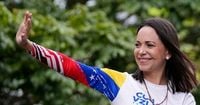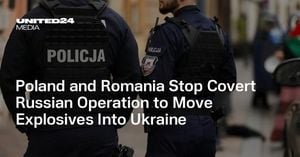The announcement of María Corina Machado as the 2025 Nobel Peace Prize laureate has triggered a tidal wave of reactions across the globe—some celebratory, many deeply critical, and all underscored by the controversy that has long dogged the world’s most famous peace award. For many, the decision is a reflection of the complex, and at times confounding, politics surrounding both the prize itself and the figure it now honors.
On October 21, 2025, the Norwegian Nobel Committee awarded the Peace Prize to Machado, a Venezuelan activist known for her unwavering advocacy for democracy in her home country. According to the Atlanta Journal-Constitution, Machado has spent years living under threat, forced into secrecy within Venezuela and communicating with the outside world only through Zoom. Her selection was announced in Oslo by Jorgen Watne Frydnes, chairman of the Nobel Committee, who praised Machado’s “tireless work promoting democratic rights and peaceful transition from dictatorship to democracy.”
Yet, as reported by Globetrotter, the announcement was met with “angry—and justified—reactions,” with critics questioning how a figure so deeply embroiled in political struggle could embody the spirit of peace. The debate, however, is hardly new. The Nobel Peace Prize has long been a lightning rod for controversy, its recipients scrutinized for their alignment—or lack thereof—with Alfred Nobel’s original vision: to honor those who have done the most for “fraternity between nations, for the abolition or reduction of standing armies, and for the holding and promotion of peace congresses.”
Machado’s path to the Nobel stage is as complex as Venezuela’s recent history. In 2003, she co-founded Súmate, a civic group that collected signatures for a recall referendum against then-President Hugo Chávez. As recounted by Charles Shapiro, former U.S. ambassador to Venezuela, “Machado is the bravest, fiercest person I have ever met. Even now she lives in Venezuela in a secret location with the threat of arrest hanging over her.” Her activism made her a household name among Venezuelans hoping for democratic reform, but also a target of the government’s ire.
In 2023, Machado won the opposition’s primary with a staggering 92 percent of the vote, a testament to her popularity and the hope she inspired among those yearning for change. However, the government swiftly disqualified her from running in the presidential election, citing technicalities that many observers saw as politically motivated. Despite being stripped of her seat in Venezuela’s National Assembly in 2014, Machado continued to organize and inspire, training more than 600,000 volunteer poll watchers and building an independent electoral database to monitor official polling places. According to the Atlanta Journal-Constitution, “Her contribution to democracy in Venezuela is equally about the fractured machine she has every right to have: a team recruited to shore up pivotal poll voting, trained volunteers, and a database developed independently from every official polling place.”
Machado’s efforts have not gone unnoticed by the international community. In 2024, she received both the Sakharov Prize and the Václav Havel Human Rights Prize, further cementing her status as a symbol of resistance against authoritarianism. The Nobel Committee’s decision to honor her, however, has reignited a perennial debate: Is the Nobel Peace Prize a true measure of moral courage, or a tool of Western geopolitical interests?
As Biljana Vankovska, a political scientist and member of the Transnational Foundation of Peace and Future Research, wrote for Globetrotter, “History shows that the Nobel Peace Prize has often gone to war criminals, opportunists, and politically ‘convenient’ figures—honored not for moral courage, but for alignment with Western geopolitical logic. Rarely has a laureate inspired unqualified applause.” Vankovska cites examples ranging from Fritz Haber, the “father of chemical weapons,” to political heavyweights like Milton Friedman and Henry Kissinger. Even Barack Obama, who famously admitted he didn’t fully understand why he was chosen, left behind a legacy marked by military interventions.
Vankovska’s critique extends to recent laureates, arguing that the prize increasingly rewards dissidents from non-Western systems, opposition movements, and figures whose stories fit conveniently into Western narratives. She points out that the prize fund itself—about one million euros—is generated from the interest on Nobel’s fortune, which, she notes, “like all capital, reproduces itself through global capitalism—the same system that fuels war, inequality, and poverty.”
Despite these criticisms, for many Venezuelans and supporters abroad, Machado’s recognition is a powerful affirmation of their struggle. The Nobel announcement has drawn renewed attention to the Maduro regime’s contested legitimacy and the ongoing crisis in Venezuela. The Atlanta Journal-Constitution highlights how Machado’s campaign, despite being shut down by authorities, managed to mobilize public support and document electoral irregularities. The Carter Center, Organization of American States, and United Nations all questioned the integrity of the 2023 presidential election, with official results showing Maduro’s victory but independent observers citing widespread discrepancies.
Machado’s supporters argue that her award symbolizes more than just personal recognition. It is, as Shapiro writes, “a recognition of the steadfast support of a society resisting militarization and never wavering in peaceful opposition.” Others see it as a rebuke to the Venezuelan government, which has worked tirelessly to silence dissent and control the narrative. The prize, they say, puts a global spotlight on Venezuela’s struggle for democracy and the courage of those who continue to fight for it despite grave personal risks.
Still, the controversy lingers. Critics argue that the Nobel Committee, described by Vankovska as “a politically chosen and opaque committee, masquerading as an independent body,” has strayed far from Nobel’s original intent. The prize, they contend, has become a tool for advancing the interests of the neoliberal world order, rewarding those who fit a particular ideological mold while overlooking others whose contributions to peace are less politically convenient.
Alternative nominees, such as Francesca Albanese, Greta Thunberg, or Palestinian journalists and medics, have been floated by those who believe the prize should honor those who endure and prevent suffering, not simply those who oppose regimes unfriendly to the West. Vankovska concludes, “To award it under such compromised circumstances to anyone of true moral stature would insult their courage and integrity—it is a prize unworthy of their principles.”
The debate over Machado’s Nobel Peace Prize is, in many ways, a microcosm of the larger struggle over the meaning of peace and the politics of recognition. It is a reminder that peace is not a one-day celebration or a golden medal, but a continuous, often painful, human struggle. As the world faces new and old threats—from proxy wars to the resurgence of nuclear fears—the question of who deserves to be called a peacemaker remains as contentious as ever.
For now, Machado’s name joins a long list of laureates whose legacies will be debated for years to come. Whether her award will inspire real change in Venezuela or simply fuel further controversy remains to be seen. But one thing is clear: the world’s longing for peace is as fierce—and as complicated—as ever.





